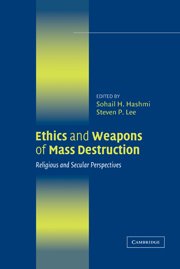Book contents
- Frontmatter
- Contents
- Tables and Figures
- Acknowledgments
- Abbreviations
- Ethics and Weapons of Mass Destruction
- Introduction
- 1 Weapons of Mass Destruction: A Brief Overview
- 2 The International Law Concerning Weapons of Mass Destruction
- PART ONE THE ORIGINAL DEBATE
- 3 Realist Perspectives on Ethical Norms and Weapons of Mass Destruction
- 4 Realism and Weapons of Mass Destruction: A Consequentialist Analysis
- 5 Natural Law and Weapons of Mass Destruction
- 6 War and Indeterminacy in Natural Law Thinking
- 7 Liberalism: The Impossibility of Justifying Weapons of Mass Destruction
- 8 A Liberal Perspective on Deterrence and Proliferation of Weapons of Mass Destruction
- 9 Christianity and Weapons of Mass Destruction
- 10 Christian Apocalypticism and Weapons of Mass Destruction
- PART TWO EXPANDING THE CONVERSATION
- PART THREE CRITICAL PERSPECTIVES
- Contributors
- Index
8 - A Liberal Perspective on Deterrence and Proliferation of Weapons of Mass Destruction
Published online by Cambridge University Press: 05 June 2012
- Frontmatter
- Contents
- Tables and Figures
- Acknowledgments
- Abbreviations
- Ethics and Weapons of Mass Destruction
- Introduction
- 1 Weapons of Mass Destruction: A Brief Overview
- 2 The International Law Concerning Weapons of Mass Destruction
- PART ONE THE ORIGINAL DEBATE
- 3 Realist Perspectives on Ethical Norms and Weapons of Mass Destruction
- 4 Realism and Weapons of Mass Destruction: A Consequentialist Analysis
- 5 Natural Law and Weapons of Mass Destruction
- 6 War and Indeterminacy in Natural Law Thinking
- 7 Liberalism: The Impossibility of Justifying Weapons of Mass Destruction
- 8 A Liberal Perspective on Deterrence and Proliferation of Weapons of Mass Destruction
- 9 Christianity and Weapons of Mass Destruction
- 10 Christian Apocalypticism and Weapons of Mass Destruction
- PART TWO EXPANDING THE CONVERSATION
- PART THREE CRITICAL PERSPECTIVES
- Contributors
- Index
Summary
I did not expect to be the focus of Henry Shue's argument about what liberalism does or doesn't permit with regard to weapons of mass destruction. I suppose that the argument of Just and Unjust Wars is in some sense a liberal argument, though it relies so heavily on Catholic theory and Jewish anxiety that perhaps it isn't best read as Shue has read it. Until very recently, liberal political theorists took little interest in war; they were concerned with domestic society (which was represented as an escape from war) and then with international cooperation. The effort to outlaw war among states as it had been outlawed among individuals strikes me as the typical liberal response to the threat of aggression: Treat war as a crime, and deal with it by summoning the global police. The continuing relevance of just war theory is a consequence of the failure (so far, at least) of this liberal project.
So Shue's reading of just war as a liberal doctrine strikes me as a reconstructive effort. But I think that it is a good effort, picking up important features of the doctrine, not only in my version of it. And he reads my version with wonderful sympathy and generosity – more than I can muster on my own behalf after all these years. I doubt that I can rise to his challenge, which focuses in careful detail on the idea of “supreme emergency” and denies its relevance to questions of deterrence.
- Type
- Chapter
- Information
- Ethics and Weapons of Mass DestructionReligious and Secular Perspectives, pp. 163 - 167Publisher: Cambridge University PressPrint publication year: 2004



